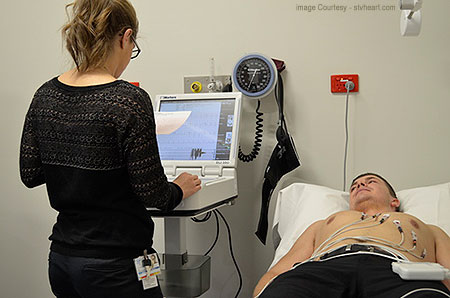
Echocardiogram or just Echo, is one of the important tests conducted to assess a person’s cardiac health. During an echo, a transducer emits high frequency ultrasonic sound waves. The transducer is then placed on the chest and moved slowly so that the sound waves penetrate the various tissues in the chest cavity including that of the heart. When the waves bounce off or echo from the heart tissues, the transducer captures the reflected waves and feeds them to a computer. Software in the computer processes these reflected waves and creates an image of the heart walls and valves.
A Stress Echocardiogram is a more dynamic test and variation of the simple echocardiogram. Here, the heart’s functioning under stress is evaluated, and the “stress” can be provided by walking briskly on a treadmill or using a medication called dobutamine.
The Dobutamine Stress Echocardiogram (DSE) is used when the patient is unable to walk on the treadmill for whatever reason. Dobutamine is injected into the person, which then causes his/her heart to beat faster, thereby replicating the effects of an exercise on the heart.
Why might I need a Dobutamine Stress Echocardiogram?
A DSE may be recommended by a cardiologist or general physician for any of the below reasons:
- To evaluate the heart’s conduction and functioning as part of general diagnosis
- To evaluate the heart’s conduction and functioning before a heart surgery
- Patients who require surgery but cannot be pre-evaluated through a treadmill test
- To evaluate stress or Exercise Tolerance in patients suspected of having CAD or coronary artery disease (CAD)
- To detect and assess severity of heart valve disease
- Patients who are recovering from a heart attack, heart surgery or myocardial infarction are put on a cardiac rehabilitation program which includes gentle exercising. Before doing so, the safe limits of exercise are assessed through a DSE
Factors that affect or interfere with a DSE
- Smoking, consuming alcohol or any psychedelic drug anytime within 3 hours of the test
- Consuming coffee/caffeine in any form anytime within 3 hours of the procedure
- Taking any beta-blocking medication anytime within 3 hours of the test
How do I prepare for a Dobutamine Stress Echocardiogram?
- Consultation with a doctor who will explain the procedure in detail
- Signing a consent form to take up the test
- Mentioning any allergic reaction you may have to certain drugs, to the doctor
- Mentioning to the doctor about any medication you are taking which includes prescription medicines, over-the-counter drugs, vitamin supplements, nutritional supplements, etc. In case, some of these are beta blockers, the doctor will either tell you to hold the medicine or give specific instructions
- Pregnant women and those who have a pacemaker inserted in them must notify the doctor upfront
- Since the test is done on Fasting, the doctor will give specific instructions on what can be consumed and what should not, within a certain number of hours before the procedure.
What happens during a Dobutamine Stress Echocardiogram?
A Dobutamine Stress Echocardiogram (DSE) is an outpatient procedure, and details of the procedure may vary from doctor to doctor and also as per your condition.
However, in general, you will be required to follow these steps before undergoing a DSE:
- Empty your bladder, and avoid drinking anything including water
- Remove watch and jewelry as these can interfere with the procedure. However, you can retain your glasses, dentures, hearing aids if the doctor has no objection.
- An IV line will be established in your hand, which is required to inject the dobutamine and IV fluid if needed.
- Lie on your left side, on the bed
- Electrodes of an electrocardiogram (ECG) are stuck into your skin, to monitor your heart’s functioning during the procedure. In addition to heart rate, blood pressure, respiration and oxygen levels are also monitored throughout. The ECG trace of the electrical activity in your heart is then compared to the images being displayed on the ECG monitor.
- Depending on your age, weight and physical condition, the doctor will decide the dosage of dobutamine to be administered. You will be started on a low dose and the same will be increased gradually till you reach the target heart rate based on the above parameters, or until the upper limit for the dobutamine dose is reached.
- From time to time, your BP will be checked, an ECG tracing taken, and the ECG images recorded.
- To achieve the above, the lab technician will move the transducer gently all over your chest area, in order to cover the full region.
- Even after the target heart rate or upper limit for the dobutamine dose is reached and the medication stopped, your heart rate, BP, ECG trace and ECG images will be monitored till such time that they are normal. This generally takes 10 to 15 minutes.
- In case of any chest pain, difficulty in breathing, excessive sweating, or palpitations of the heart are experienced by you any time during the test, you must mention the same to the doctor.
- Once all the procedure is completed, the lab technician will wipe the gel off your chest, detach the ECG pads, and extract the IV line out. You can then put on your clothes and leave.
What happens after a Dobutamine Stress Echocardiogram?
Generally, there is no specific after-care for a DSE procedure. You can go back to your regular diet and activities. However, depending on your unique situation, your doctor may recommend specific precautions to be taken.

Article by Dr. Sundar C, MD, DNB, DM, FNB
Consultant Interventional Cardiologist and Endo Vascular Specialist,
Kauvery Hospital

